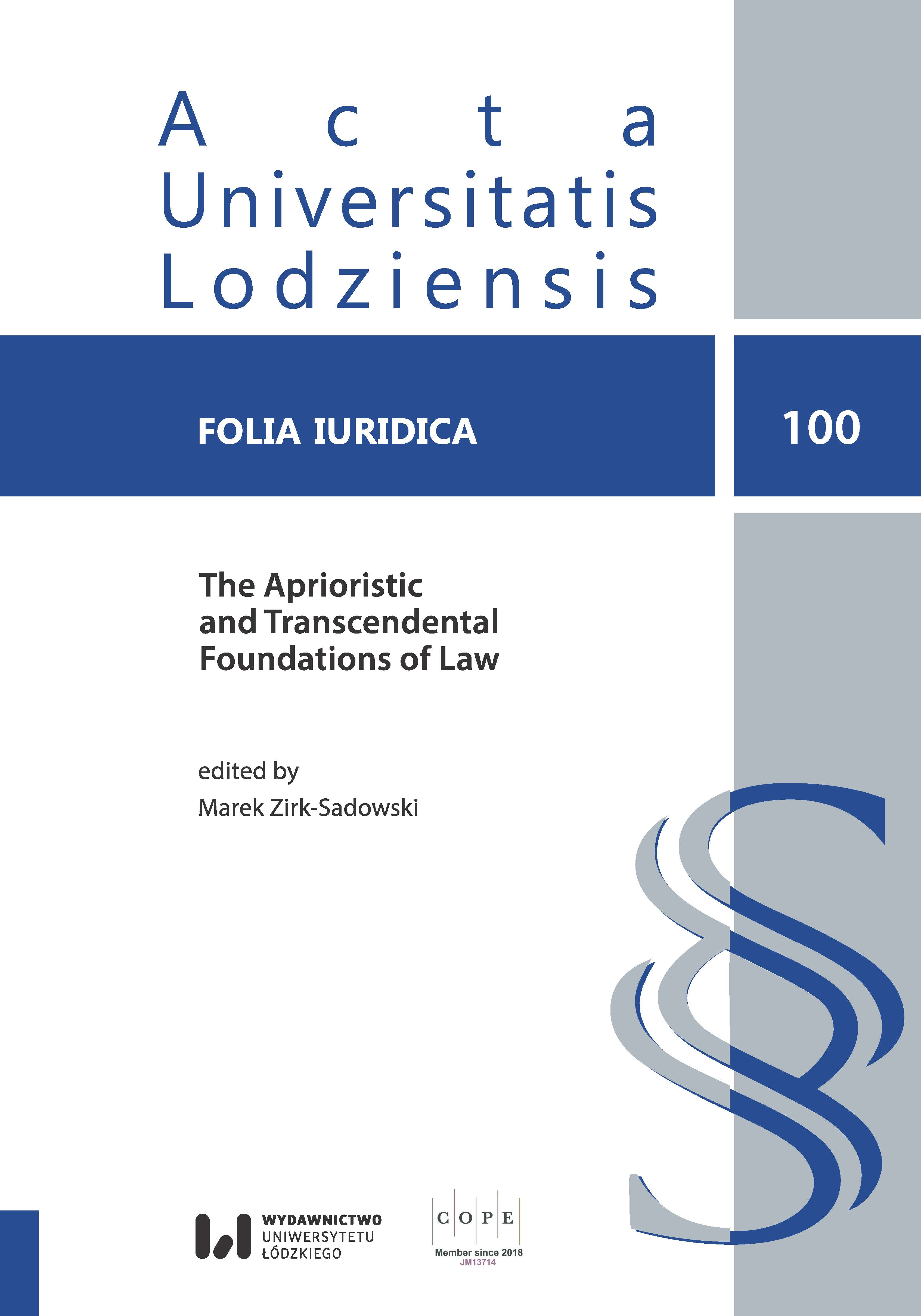Normativity and Ontology of Law in Early Greek Philosophy
DOI:
https://doi.org/10.18778/0208-6069.100.09Keywords:
arche, physis, study of nature, normativity, ontology, Thales, Anaximander, Pythagoras, EmpedoclesAbstract
The paper is devoted to the issues of the emergence of European science and philosophy, founded by the ancient Greeks. In the period known as the First Enlightenment, there was, on the one hand, a gradual departure from the mythological explanations of the reality, and, on the other, the construction of a new way of looking at the world, known as the study of nature. The inquiries of the ancient Greeks had an ontological dimension; they consisted in searching for the arche of the world and they were looking for the ultimate structure of reality, and, what is important, the human being was situated in these studies as an integral, but not the most important part of the Cosmos, subject to its laws. Presocratics did not put the human being above nature, because they did not strictly distinguish between the laws of nature and the laws of community. This was one of the reasons why the science of law did not arise at that time. Besides, the Greeks never reduced their right to the system, because too often gods or demos ‘interfered’ with the laws of the polis. It was a typical example of “law without jurisprudence”, because it was flexible and had vaguely formulated rules and institutions. Another significant factor here was the lack of the trained group of professional lawyers.
This period ended with the advent of Socrates’ philosophy. Up to his time, philosophy had studied numbers and movements, and had dealt with the question of where all things have their origin and where they disappear; it also had observed the stars, the distances between them, their circuits, as well as had studied phenomena which appear in the sky. The early sages believed that they could gain knowledge by conducting research into natural phenomena themselves. Socrates rejected the ontology and study of nature initiated by the Milesians and other early Greek thinkers in favour of searching for the meaning of words and concepts found in the Athenian polis language. He believed that finding the meaning of words translated into revealing the reality which could not be reached otherwise.
Downloads
References
Aristotle. 1933. Metaphysics. Translated by Hugh Tredennick. Cambridge, MA: Harvard University Press; London: William Heinemann Ltd. https://doi.org/10.4159/DLCL.aristotle-metaphysics.1933
Google Scholar
DOI: https://doi.org/10.4159/DLCL.aristotle-metaphysics.1933
Arystoteles. 1988. Zachęta do filozofii. Translated by Kazimierz Leśniak. Warszawa: Państwowe Wydawnictwo Naukowe.
Google Scholar
Burnet, John. 1920. Early Greek Philosophy. London: Adam and Charles Black.
Google Scholar
Curd, Patricia. 2019. “Presocratic Philosophy.” In The Stanford Encyclopedia of Philosophy. Edited by Edward N. Zalta. Stanford, CA: Stanford University. https://plato.stanford.edu/archives/sum2019/entries/presocratics/
Google Scholar
Dembiński, Bogdan. 2010. Późny Platon i Stara Akademia. Kęty; Wydawnictwo Marek Derewiecki.
Google Scholar
Diogenes Laertius. 1972. Lives of Eminent Philosophers. Translated by Robert Drew Hicks. Cambridge: Harvard University Press.
Google Scholar
Diogenes Laertius. 2004. Żywoty i poglądy słynnych filozofów. Translated by Irena Krońska. Warszawa: Wydawnictwo Naukowe PWN.
Google Scholar
Homer. 1919. The Odyssey. Translated by Augustus T. Murray. Vol. I–II. Cambridge, MA: Harvard University Press; London: William Heinemann.
Google Scholar
Homer. 1924. The Iliad. Translated by Augustus T. Murray. Vol. I. Cambridge. MA: Harvard University Press. https://doi.org/10.4159/DLCL.homer-iliad.1924
Google Scholar
DOI: https://doi.org/10.4159/DLCL.homer-iliad.1924
Homer. 1925. The Iliad. Translated by Augustus T. Murray. Vol. II. London: William Heinemann.
Google Scholar
Homer. 1945. The Odyssey. Translated by Augustus T. Murray. Cambridge: Massachusetts Harvard University Press.
Google Scholar
Kahn, Charles H. 1960. Anaximander and the Origins of Greek Cosmology. New York: Columbia University Press. https://doi.org/10.7312/kahn90334
Google Scholar
DOI: https://doi.org/10.7312/kahn90334
Krokiewicz, Adam. 1971. Zarys filozofii greckiej. Od Talesa do Platona. Warszawa: Pax.
Google Scholar
McKirahan, Richard D. 2010. Philosophy before Socrates. Indianapolis: Hackett Publishing Company.
Google Scholar
Morgan, Kathryn. 2000. Myth and Philosophy from the Presocratics to Plato. Los Angeles: Cambridge University Press. https://doi.org/10.1017/CBO9780511482540
Google Scholar
DOI: https://doi.org/10.1017/CBO9780511482540
Most, Glenn. 1999. “From Logos to Mythos.” In From Myth to Reason? Studies in the Development of Greek Thought. Edited by Richard Buxton. 25–49. New York: Oxford University Press.
Google Scholar
Naddaf, Gerard. 2009. “Allegory and the Origins of Philosophy.” In Logos and Muthos, Philosophical Essays in Greek Literature. Edited by William Wians. 99–131. Albany: State University of New York Press.
Google Scholar
Ortega y Gasset, Jose. 1993. Wokół Galileusza. Translated by Ewa Burska. Warszawa: Spacja.
Google Scholar
Parandowski, Jan. 1960. Mitologia. Wierzenia i podania Greków i Rzymian. Warszawa: Czytelnik.
Google Scholar
Plato. 1888. The Timaeus of Plato. Translated by Richard D. Archer-Hind. London: Macmillan.
Google Scholar
Plato. 1921. Theaetetus. Translated by Harold N. Fowler. Vol. XII. Cambridge, MA: Harvard University Press, London: William Heinemann.
Google Scholar
Plato. 1956. Protagoras. Translated by Benjamin Jowett. Indianapolis–New York: The Bobbs-Merrill Company.
Google Scholar
Schyff, Dylan van der. 2010. On Being and Becoming: Ancient Greek Ethics and Ontology in the Twenty-First Century. Master of Arts Degree, Simon Fraser University.
Google Scholar
Snell, Bruno. 2009. Odkrycie ducha. Studia o greckich korzeniach europejskiego myślenia. Translated by Agna Onysymow. Warszawa: Wydawnictwo Aletheia.
Google Scholar
Strabo. 1924. The Geography of Strabo. Edited by Horace L. Jones. Cambridge, MA: Harvard University Press, London: William Heinemann.
Google Scholar
Stróżewski, Władysław. 2006. Ontologia. Kraków: Aureus, Znak.
Google Scholar
Świeżawski, Stefan. 2000. Dzieje europejskiej filozofii klasycznej. Warszawa–Wrocław: Wydawnictwo Naukowe PWN.
Google Scholar
Voegelin, Eric. 2013. Świat polis. Translated by Michał Czarnecki. Warszawa: Fundacja Świętego Mikołaja, Redakcja ”Teologii Politycznej.”
Google Scholar
White, Stephen. 2002. “Thales and the Stars.” In Presocratic Philosophy Essays in Honour of Alexander Mourelatos. Edited by Victor Caston, Daniel W. Graham. 3–17. Oxfordshire–New York: Ashgate Publishing.
Google Scholar
Wittgenstein, Ludwig. 1953. Philosophical investigations. Translated by Gertrude E.M. Anscombe. Oxford: Basil Blackwell.
Google Scholar
Witwicki, Władysław. Ed. 1957. Platona Uczta. Warszawa: Państwowe Wydawnictwo Naukowe.
Google Scholar
Published
How to Cite
Issue
Section
License

This work is licensed under a Creative Commons Attribution-NonCommercial-NoDerivatives 4.0 International License.














